Ridiculous/Hilarious/Terrible/Cool (25 page)
Read Ridiculous/Hilarious/Terrible/Cool Online
Authors: Elisha Cooper
Daniel was recently interviewed by the
Chicago Tribune
for an article about outstanding minorities going to outstanding colleges. He's excited about Penn. And today he gets to see the mayor.
Chicago Tribune
for an article about outstanding minorities going to outstanding colleges. He's excited about Penn. And today he gets to see the mayor.
The mayor is coming to Payton for the opening of the Confucius Institute, a
thing
within the Chicago public schools funded by the Chinese government. It's not clear what the
thing
is (library, computer room, cultural center for understanding and propaganda), but it has shut down the bathrooms and lockers and stairs at the east end of the atrium. Filling the space are Chinese diplomat types in red scarves, local politicians in suits, and student greeters in red T-shirts.
thing
within the Chicago public schools funded by the Chinese government. It's not clear what the
thing
is (library, computer room, cultural center for understanding and propaganda), but it has shut down the bathrooms and lockers and stairs at the east end of the atrium. Filling the space are Chinese diplomat types in red scarves, local politicians in suits, and student greeters in red T-shirts.
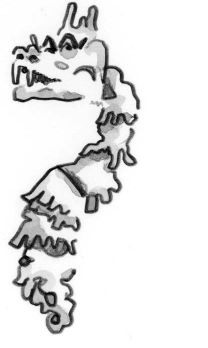
TV camera lights snap on. Dignitaries step to a podium: the principal, the alderman, the head of the Chicago public schools, the head of the Confucius Institute in his thick black Mao glasses, the mayor.
As the mayor begins his speech, Daniel listens intently. He thinks,
I can do this
. The public appearances, the meetings, the openings. It gives Daniel motivation, gives him thoughts about his future.
I can do this
. The public appearances, the meetings, the openings. It gives Daniel motivation, gives him thoughts about his future.
At the other end of the atrium are a group of Payton students, and they are oblivious. They're playing Ping-Pong. They're loud. They have been asked to stop. Their ball-smacking and shouting start making it difficult to hear the mayor. The games are drowning him out. Administrators scurry over to install order but they can't quite.
Daniel doesn't turn his head. Eventually the Ping-Pong uprising is squashed. The ceremony continues. Little speeches, little choreographed moments, little patterings of polite applauseâexcept from Daniel. When the mayor finishes his speech, Daniel claps especially hard.
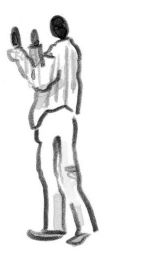
Since that awful tie with Parker, Emily's team has been playing well and winning games. Emily's sister recovered from her twisted ankle. While she doesn't have Emily's ball skills, she is faster, and has a wicked shot. She's the future.
Today is a big cloud day, and the stands of Winnemac Park on the city's North Side are packed with students and parents. Payton is playing Lane Tech in the semis of the Chicago city tournament. As the second half starts, the game remains scoreless: the type of game that ends with a mistake. If it does, number 13 for Lane Tech will probably have caused it. Number 13 is thin as a blade of grass, and as hard to catch. She has kept the Payton defenders on their heels all day with blazing acceleration and cocky moves. It's a wonder she hasn't scored. Already she's knocked two balls off the goalposts. When she clangs another shot into the post, a penalty shot, even the referee puts his hand to his head. Maybe luck is with Payton today.
The sun begins lowering over the field, and it's pink and very pretty. Then, a mistake. A scuffed clearance that lands at the feet of number 13, who races the length of the field and slides the ball under the Payton goalie. Game over.
Emily is the last player off the field. One of her freshmen tries to comfort her by putting her arm around her shoulder. Emily shakes it off. As their coach talks to them, Emily sits in the stands three rows above her team. Some players are crying. Not Emily. But the game isn't her last. Next week is States.
Maya made her decision. NYU. She's already gotten her NYU e-mail address, she'll be in a great acting studio, she'll be in another studio that studies art by going to Appalachia and playing music and stuff. At this, Maya laughs and cracks her knuckles and flips her bangs, all at the same time.
“I'm really excited!”
Maya just finished eating lunch in of all places the cafeteria. She almost never eats there, as she's one of the seniors who go out for lunch, but today she was late and her friends went without her. Now she's killing time, sitting on a bench in the atrium, listening to a man tune a piano.
The piano is being tuned for some performance later in the week. The tuner starts hitting the low notes,
dong, dong, dong,
and Maya raises one eyebrow at the absurdity of having her words set to a soundtrack.
dong, dong, dong,
and Maya raises one eyebrow at the absurdity of having her words set to a soundtrack.
“
Okay!
I went to work the other day? I was punching numbers into the cash register, and I had a panic attack. Having to listen to the
same
video music playing, punching numbers into a
cash
register. I can't deal with this. Is this me? And then I was, like,
okay
.”
Okay!
I went to work the other day? I was punching numbers into the cash register, and I had a panic attack. Having to listen to the
same
video music playing, punching numbers into a
cash
register. I can't deal with this. Is this me? And then I was, like,
okay
.”
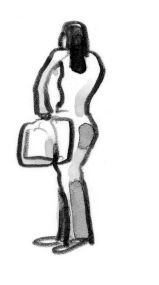
It wasn't bad for one reason. “I think in terms of material. I do that with everything if I'm complaining. If I'm having trouble with someone I can use them as a character.”
It's a strategy she finds helpful. Just last week Maya went to a poetry reading. Ms. Murphy told the entire English class to go but only Maya went. There she was, the one person under thirty, everyone around her acting smart and literary, saying
hmmm
at the end of each poem, and the whole thing was so silly she thought about leaving. But after looking at the crowd she stayed and took mental notes, and when she got home she wrote them down.
hmmm
at the end of each poem, and the whole thing was so silly she thought about leaving. But after looking at the crowd she stayed and took mental notes, and when she got home she wrote them down.
The same appreciation for the bizarre may help Maya with prom. She's been asked by bunches of boys, none of whom she wants to go with. One even asked her on Facebook.
“I didn't actually respond. I'm pretty much a terrible person! I didn't want to ruin his feelings.”
Maya scrunches up her nose. She's decided to go to prom with another friend, a boy she's been friends with since freshman year. She hopes he understands they're going as friends. People have a way of not understanding, though. Like Ben, the ex-boyfriend. Things haven't worked out between them in the amicable way Maya would have wished.
Dee, dee, dee.
The tuner starts hitting the high notes.
The tuner starts hitting the high notes.
Maya squints at him, possibly adding another character to her list.
Dee, dee, dee.
“This music is making me nervous,” she says. She turns to the tuner and whispers fiercely: “Oh, God.
Stop!
”
Stop!
”
The man can't hear. Maya cracks up, and pokes her tongue into her cheek, turning her cheek into her cheek tent.
Maya knows she fidgets, knows she has a whole array of tics. The tongue in cheek, the rolling foot, the hand washing. Her sisters tease her about her tics all the time. Sometimes she thinks she fidgets because it's calming, and then she notices she fidgets even when she's not nervous. Maybe it's just part of who she is, as indelible as a birth mark.
The piano tuner has stopped. Maya gets up to go. She has somewhere she must be. Last week the yearbook came out and Maya had been voted
Most Likely to Be Famous
.
Most Likely to Be Famous
.
If the atrium is a stage, the bathrooms may be the art house theaters that show the edgier plays. One work-in-progress from the spring season, as yet untitled:
“You sucking your thumb?”
“Naw.”
“You got a nosebleed?”
"Uh.”
“You better go splash some water on that!”
“Uh-huh.”
(The boy with the nosebleed exits.)
“Hey, why'd you hit that boy?”
Diana sits in the field next to the high school, twirling her ID around her forefinger. She's wearing blue gym shorts. Her flip-flops are off. When not twirling her ID, she's ripping blades of grass and piling them on her toes.
“It's nice outside. So I think it's summer!”
Diana has always felt that high school was just one part of her life. Now that part is even smaller. She feels she's in a different world. Last week she only came to school one day. For four
years
she's been going to class, doing homework, volunteering, applying herself. Now that's almost over.
years
she's been going to class, doing homework, volunteering, applying herself. Now that's almost over.
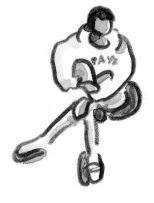
“I've been so thoughtful for so long,” she says.
Diana's best friend Sandra runs over and whispers in her ear: Their old friend Suki is going to prom with the cute guy everyone wanted to go to prom with. Sandra runs away.
Diana hasn't told Sandra, but last week she went to a party with Suki. It's not the same as before they had their falling out, but it was nice to see that some part of the friendship survived.
“I have a lot of different friends, and they don't all get along. People have their own opinions. It's always been like that.”
Friends are a constant juggling act for Diana. Each group claiming her for their own: friends from the neighborhood who tell Diana she shouldn't act too white, white friends who tell her she shouldn't act too ghetto, other friends. With more free time now, there's more time for drama with her friends. There's even been some tension between Diana and Sandra.
Diana doesn't know who she's going to prom with. She knows she will go with friends, but which ones is a question. She knows her mother will make her dress.
She stops.
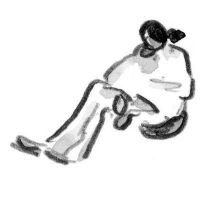
Her brother is coming home from jail next week.
“He's going to be on house arrest. I don't know for how long. I feel we're going . . . ” Diana pauses and plucks some grass. “I feel it's going to be stressful for all of us. I can see it coming.
Other books
This Little Piggy Went to Murder by Ellen Hart
2020: Emergency Exit by Hayes, Ever N
The Blue Hour by T. Jefferson Parker
Trinidad Street by Patricia Burns
Easterleigh Hall at War by Margaret Graham
Catch as Cat Can by Rita Mae Brown
The Malacca Conspiracy by Don Brown
FOUND: A Motorcycle Club Romance Novel by Korin, Scarlet
Season's Greetings by Lee_Brazil
Angel's Tip by Alafair Burke